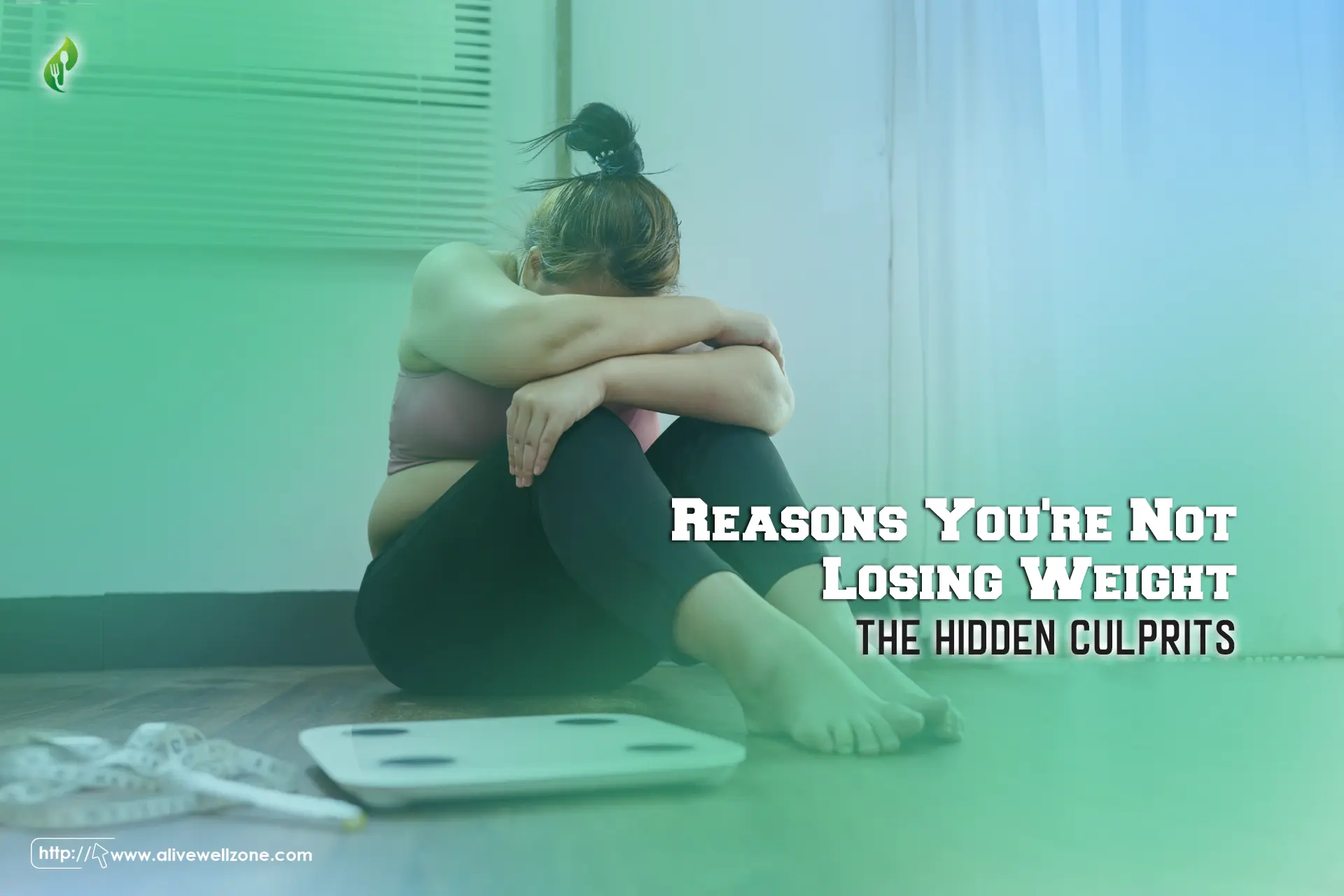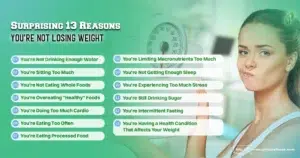
Last Updated on November 19, 2024 by Helena Akter
Losing weight and keeping it off is far more complicated than “eat less, move more.” Subtle, unseen factors often defeat the best efforts of even the most disciplined dieter. That’s why you need to get to the root of why you’re not losing weight
You aren’t losing weight because you drink too little water, sit excessively, don’t eat whole foods, overeat “healthy” foods, or excessively exercise. Besides, you might eat too much, eat processed food, limit macronutrients, lack sleep, experience high stress, drink sugary drinks, and have intermittent fasting.
Today, we’ll explain the 13 most common reasons you’re not losing weight. As a result, you’ll have a clear plan customized to your unique barriers to finally see the scale drop.
Surprising 13 Reasons You’re Not Losing Weight

A Gallup Poll indicates that more than half of U.S. adults aim to lose weight, with 26% having made significant efforts in the last five years. And many of them are curious to know why their weight isn’t reducing. Well, here are the reasons —
1. You’re Not Drinking Enough Water
Water quenches thirst without calories, helping avoid sugary drinks that lead to weight gain. So, drinking 2 to 6 cups of water daily can help in weight loss.
Besides, dehydration can lead to weight gain, a weaker immune system, etc. So, drink water!
2. You’re Sitting Too Much
Long sitting periods might cause weight gain. In fact, every two hours of sitting increases obesity risk by 5%.
Moreover, adults should aim for up to 300 minutes of moderate or 150 minutes of intense exercise weekly. Starting with 60 minutes a week is good for beginners.
The key is to stay active, even with simple actions like taking stairs, parking further, running, or walking more to stay hydrated.
3. You’re Not Eating Whole Foods
The quality of your food matters as much as the amount. Whole foods boost health and control hunger better than processed foods. So, watch out for “health foods” that aren’t truly healthy, checking ingredients for added sugars or carbs.
4. You’re Overeating “Healthy” Foods
Even healthy foods can lead to weight gain if eaten in excess. Swapping ice cream for Greek yogurt is good, but don’t double your portion. The rule “eat less, move more” still applies.
However, vegetables are an exception; eating more can actually aid weight loss by reducing cravings for unhealthy foods. Still, remember portion control is key, even with healthy swaps. Consider using a food-tracking app to monitor calorie intake.
5. You’re Doing Too Much Cardio
Doing a lot of cardio can be great for your heart health, helping to prevent various diseases, improve sleep, and reduce stress. However, too much cardio, especially without enough food, can slow down your metabolism.
It happens because your body starts to save energy, thinking it needs to conserve. The American Heart Association suggests aiming for 150 minutes of moderate exercise or 75 minutes of intense exercise each week.
6. You’re Eating Too Often
Eating too frequently is also a misconception for improving metabolism and shedding pounds. Research indicates that how often you eat doesn’t significantly impact weight loss or how your body burns fat.
Meanwhile, evidence shows that snacking can be good if you choose healthy options and keep your meals to four or five a day. intermittent fasting, which involves not eating for 15–24 hours or more, is an effective way to lose weight.
7. You’re Eating Processed Food
Eating processed foods can be one of the reasons you’re not losing weight. Many convenience and “health” foods are highly processed and contain unhealthy ingredients, like hydrogenated oils and high-fructose corn syrup.
The National Institutes of Health highlights that such foods can increase your calorie consumption. Plus, a diet rich in processed foods can also harm your gut health. Research published in Nutrients in 2019 shows that it can disrupt the balance of gut bacteria.
Further, a 2020 study in Preventive Nutrition and Food Science explains that gut bacteria diversity affects metabolism. Incorporating probiotics, prebiotics (found in fruits and vegetables), and synbiotics into your diet can counteract weight gain mechanisms. Eating foods in their natural state helps you stay full longer.
8. You’re Limiting Macronutrients Too Much
Cutting out important nutrients like carbs, which are the main energy source for your body, can lead to cravings and overeating.
So, to balance your diet you first need to know the importance of carbohydrates and —
- Include healthy fats found in chia seeds, hemp seeds, and fatty fish such as salmon.
- Opt for lean meats or plant-based proteins like beans and lentils.
- Choose complex carbohydrates such as sweet potatoes, oats, and quinoa, and limit simple sugars found in candy and processed snacks.
9. You’re Not Getting Enough Sleep
Not getting enough sleep can lead to weight gain. Studies suggest that women sleeping less than five hours a night might gain more weight compared to those who sleep seven hours.

In fact, lack of core sleep can affect your mood, appetite, heart health, and immune system! It can also reduce your physical activity, leading to fewer calories burned.
Adequate sleep is essential for weight loss and overall well-being, affecting both your physical and mental health. Aim for about eight hours of sleep per night by maintaining a consistent bedtime routine.
10. You’re Experiencing Too Much Stress
Too much stress can lead to high levels of cortisol, a hormone that helps muscles use energy but also can cause stubborn fat if it’s constantly high. This might happen if
- You’re under a lot of stress at home or work,
- Not resting enough, or
- Not sleeping well.
While “stress less” might seem like vague advice, identifying areas of your life where you can reduce stress is crucial. If stress or anxiety is overwhelming, consider seeking help from a mental health expert.
11. You’re Still Drinking Sugar
Drinking sugary drinks is a major cause of weight gain because they add calories without reducing hunger for other foods. It’s true for not just sodas but also drinks marketed as healthy, like Vitaminwater, which is high in sugar.
Fruit juices, too, should be limited as they can have as much sugar as several pieces of fruit.
12. You’re Intermittent Fasting
Intermittent fasting, or eating only during certain hours, helps some people lose weight but can lead to overeating for others once the fasting period ends. This approach might also make you feel unfocused and tired, causing you to skip workouts or other activities that burn calories.
However, it doesn’t work the same for everyone, and women need to be cautious as it can affect hormone levels. So, listen to your body; if you find yourself too hungry after fasting for 14 to 16 hours, consider shortening the fasting window to 12 to 14 hours.
If you still overeat or reduce your physical activity, it might be better to limit fasting to no more than 12 hours.
13. You’re Having a Health Condition That Affects Your Weight
Some health issues can make it hard to lose weight. These include
- Cushing syndrome, which is caused by too much cortisol over time
- Diabetes
- Depression
- Hypothyroidism (when your thyroid gland isn’t active enough)
- Hypogonadism (when your sex glands produce few or no hormones)
- Polycystic ovary syndrome (PCOS) where ovaries or adrenal glands produce too many male hormones
- Menopause
Conclusion
There are many reasons you’re not losing weight. These include not drinking enough water, sitting too much, and eating processed or too many “healthy” foods.
Plus, doing too much cardio, eating too frequently, or not getting a balanced mix of nutrients can also slow down weight loss. Other factors like not enough sleep, too much stress, drinking sugary beverages, not following intermittent fasting correctly, and certain health issues play a role too.
To overcome these obstacles, try improving your healthy habits and listening to what your body needs. If you have health concerns, it’s best to seek advice from a healthcare professional.
FAQs of reasons you’re not losing weight
Why do I feel thinner but weigh the same?
You might not see a weight change even if you’re getting slimmer because you’re gaining muscle while losing fat. Muscle and fat weigh the same, but muscle is denser and takes up less space, making you look more toned.
What is the 30 30 30 rule for weight loss?
The 30-30-30 rule for weight loss suggests eating 30 grams of protein within 30 minutes of waking up and then doing 30 minutes of gentle exercise. This approach focuses on these specific actions without requiring calorie counting or other dietary restrictions.
Why am I not losing weight by walking 10,000 steps a day?
Not losing weight by walking 10,000 steps a day could be because you’re not burning more calories than you consume. Simply walking a lot doesn’t guarantee weight loss; creating a calorie deficit is essential for fat loss.







